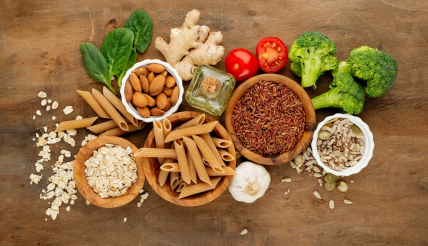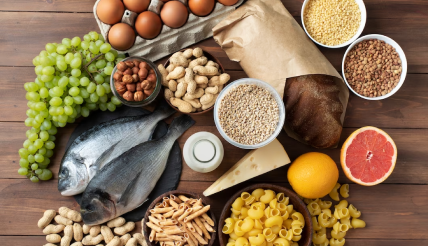You may also like…
Balancing Macronutrients: Proteins,
Fats and Carbohydrates
Carbohydrates:
These include breads, grains, fruits, vegetables, milk, yogurt, sugary foods.
4 calories in a gram of carbohydrate
Think of carbohydrates as the fuel that powers your body, much like gasoline propels a car forward. These macronutrients consist of sugars and starches intricately woven together, serving as the primary energy source for your body's daily activities. Stored in muscles and the liver as glycogen, carbohydrates ensure a steady reservoir of energy, even if you miss a meal or two. Upon consumption, they are diligently broken down into glucose, the preferred cellular currency for energy. You'll find carbohydrates generously distributed throughout fruits, grains, rice, legumes, and a diverse array of vegetables, including potatoes, yams, and corn.
Proteins:
These include meat, seafood, legumes, nuts and seeds, eggs, milk products, vegetables.
4 calories in a gram of protein
Proteins stand as the architectural backbone of your body, providing the essential building blocks for cells and tissues. During digestion, proteins are transformed into amino acids, which play pivotal roles in growth, development, tissue repair, and maintenance. Beyond this, proteins bestow structure upon muscles and bones, and they step in as repair agents when tissues suffer damage. For instance, the skin boasts the presence of keratin, a protein that hardens and heals damaged skin cells. The sources of protein are manifold, encompassing beef, pork, chicken, fish, beans, eggs, and dairy products. It's worth noting that not all proteins are created equal; animal proteins tend to exhibit higher bioavailability, making them more efficiently absorbed by the body.
A diet that contains 20% or more of its calories from protein.
0.8g * weight (in kg) = grams of protein per day
For example
0.8g * 75 kg = 60 g of protein/day
Fats:
These include oils, butter, egg yolks, animal products.
9 calories in a gram of fat
Fats serve as both the structural scaffold and protective cushion for cells and membranes. Their role in shielding the body against harm is paramount, while they also facilitate the absorption of specific vitamins. Among vitamins, A, D, E, and K are fat-soluble, requiring fats for optimal absorption. Dietary sources of fats span animal fats, avocados, oils, nuts, dairy, fish, and coconut. However, it's crucial to discern between various fat types. Opt for polyunsaturated and monounsaturated fats over saturated fats, as the latter is associated with increased heart disease risk and elevated cholesterol levels. Monounsaturated fats are prevalent in olive, peanut, and canola oils, Avocados, Nuts (almonds, hazelnuts and peanuts), and polyunsaturated fats are prevalent in Sunflower, corn, soybean, flaxseed oils, walnuts, flaxseed, fish and canola oil.






